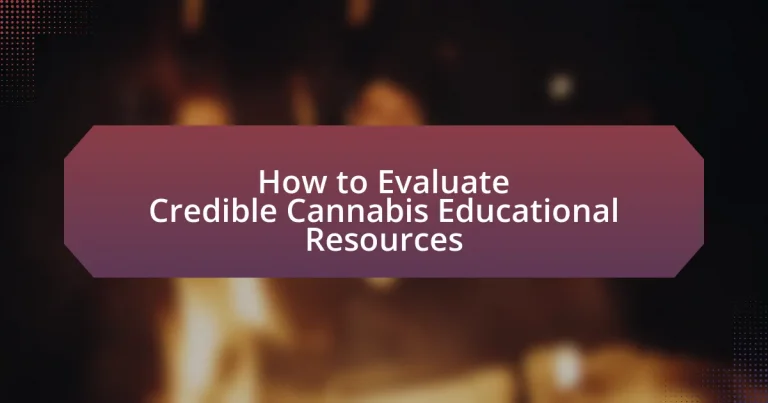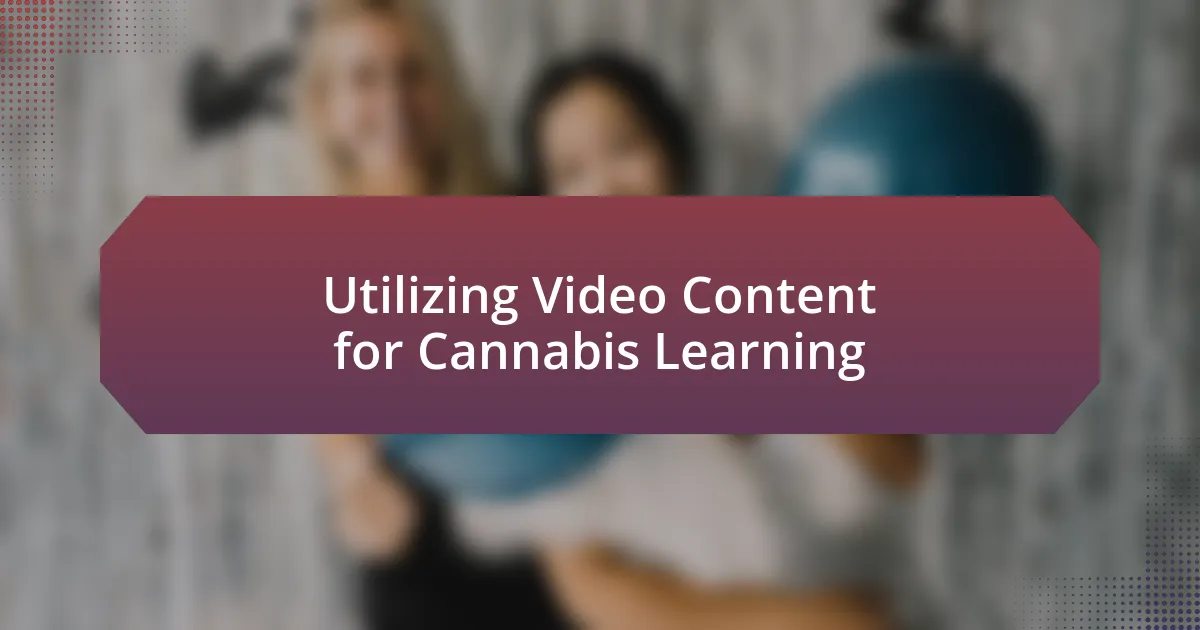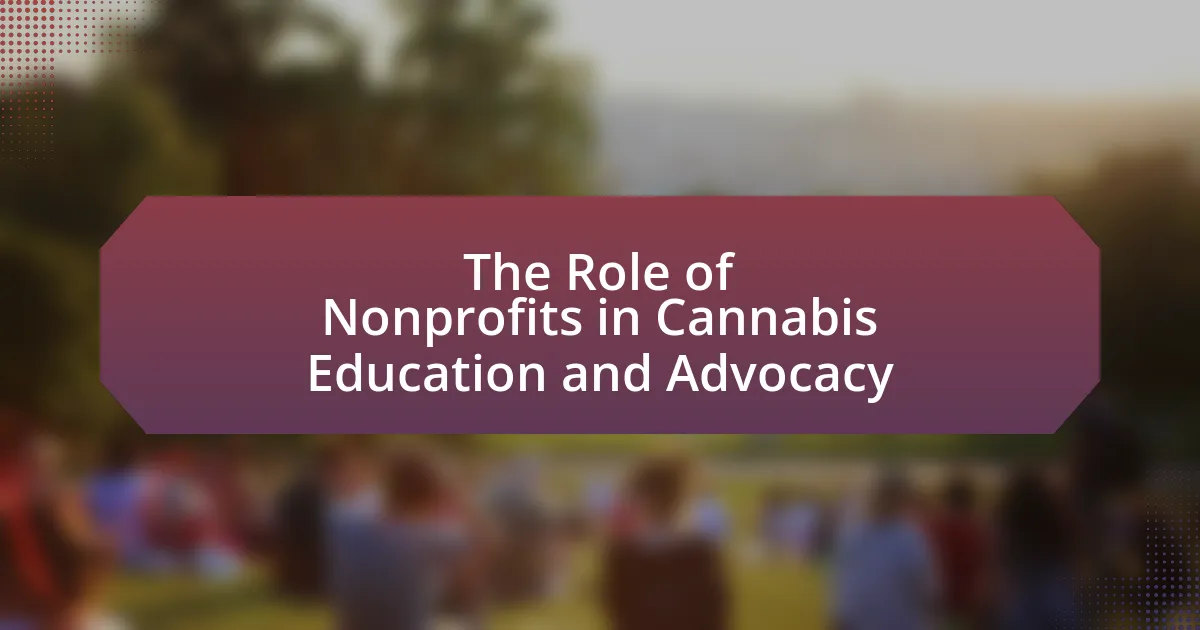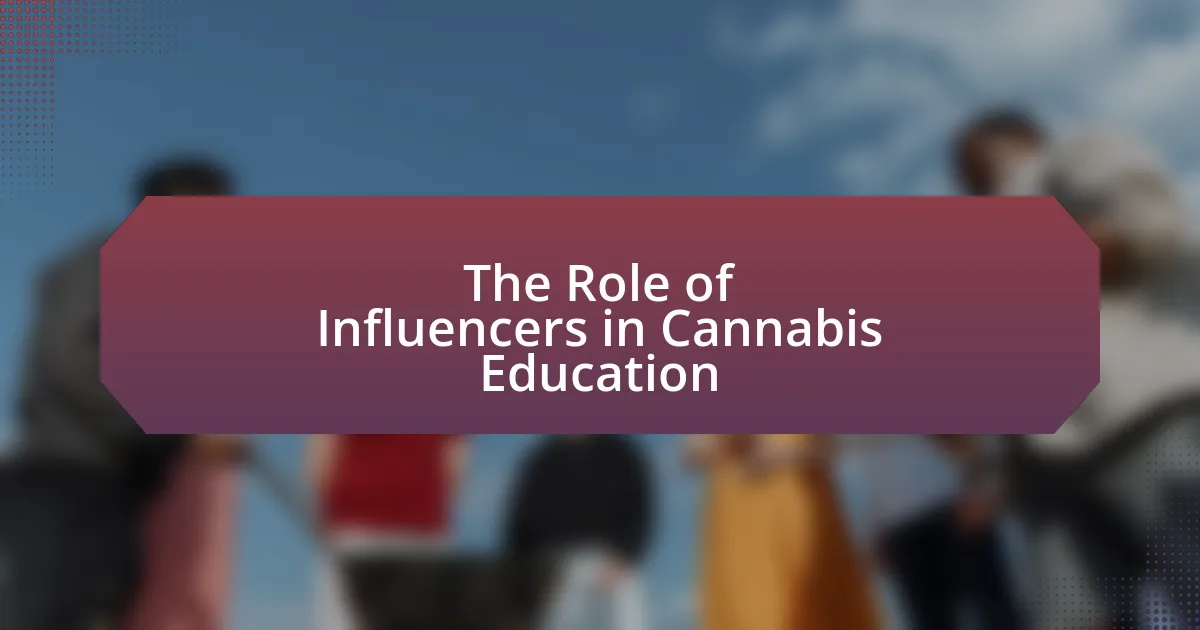Credible cannabis educational resources are essential for providing accurate, evidence-based information about cannabis, including its effects, uses, and regulations. This article outlines how to identify and evaluate these resources, emphasizing the importance of peer-reviewed journals, reputable organizations, and expert qualifications. It discusses the criteria for assessing credibility, the risks associated with unreliable information, and the role of various educational formats, such as online courses and webinars. Additionally, it highlights best practices for finding trustworthy cannabis educational materials to ensure informed decision-making.
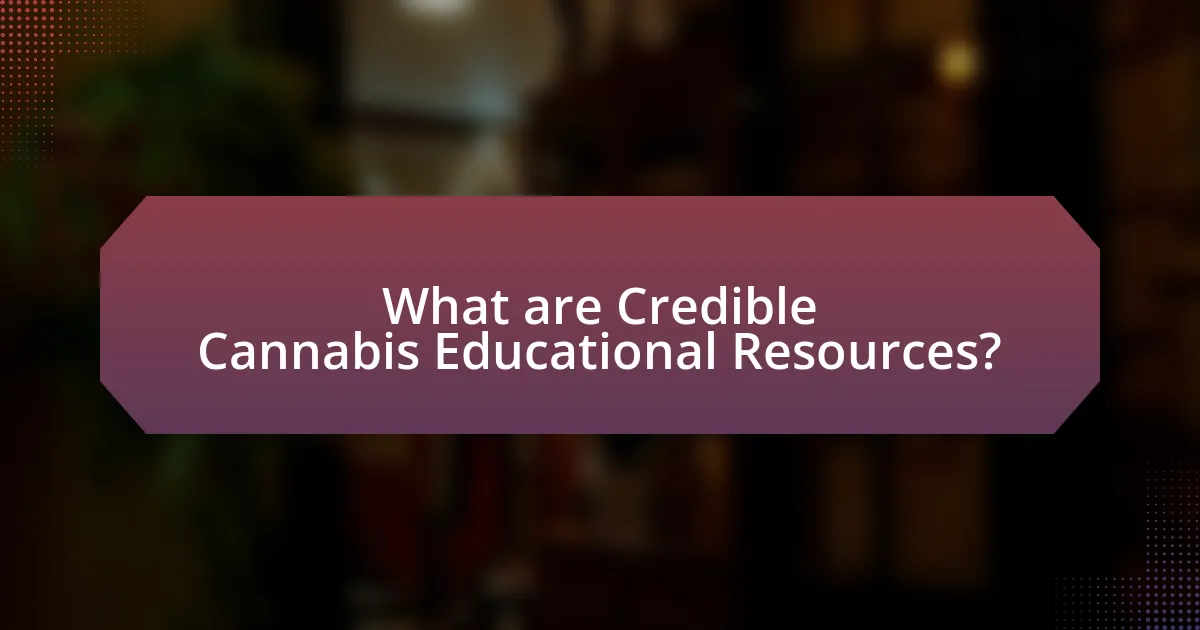
What are Credible Cannabis Educational Resources?
Credible cannabis educational resources are authoritative materials that provide accurate, evidence-based information about cannabis. These resources include peer-reviewed journals, government publications, and reputable organizations such as the National Institute on Drug Abuse and the American Medical Association, which offer scientifically validated data on cannabis use, effects, and regulations. The reliability of these resources is often supported by rigorous research methodologies and expert consensus, ensuring that the information presented is trustworthy and relevant for both consumers and professionals in the field.
How can you identify credible sources in cannabis education?
To identify credible sources in cannabis education, prioritize information from peer-reviewed journals, reputable organizations, and experts in the field. Peer-reviewed journals, such as the Journal of Cannabis Research, ensure that studies undergo rigorous evaluation by qualified professionals, enhancing their reliability. Reputable organizations like the American Medical Association and the National Institute on Drug Abuse provide evidence-based information and guidelines, reflecting current scientific consensus. Additionally, experts with advanced degrees and significant experience in cannabis research or medicine can offer trustworthy insights. Evaluating the author’s credentials, the publication’s reputation, and the presence of citations from other credible sources further supports the credibility of the information.
What criteria should you use to assess the credibility of cannabis educational resources?
To assess the credibility of cannabis educational resources, prioritize the author’s qualifications, the source’s reputation, and the presence of citations. Authors with relevant degrees or professional experience in cannabis research or medicine enhance credibility. Reputable sources, such as academic institutions or established medical organizations, are more likely to provide accurate information. Additionally, credible resources should cite peer-reviewed studies or official guidelines, which support their claims and provide a basis for the information presented.
How do author qualifications impact the credibility of cannabis information?
Author qualifications significantly impact the credibility of cannabis information by establishing the author’s expertise and reliability in the subject matter. Authors with relevant academic degrees, professional experience in the field, or published research on cannabis are more likely to provide accurate and trustworthy information. For instance, a study published in the Journal of Cannabis Research indicates that articles authored by individuals with advanced degrees in pharmacology or medicine are perceived as more credible by readers compared to those without such qualifications. This correlation between qualifications and perceived credibility underscores the importance of evaluating the author’s background when assessing cannabis-related information.
Why is it important to evaluate cannabis educational resources?
Evaluating cannabis educational resources is crucial to ensure the accuracy and reliability of the information presented. Misinformation can lead to harmful consequences, such as improper usage or misunderstanding of cannabis effects, which is supported by studies indicating that inaccurate information can negatively impact public health decisions. Furthermore, the cannabis landscape is rapidly evolving, with new research emerging regularly; thus, assessing the credibility of resources helps individuals stay informed about the latest scientific findings and legal regulations.
What risks are associated with using unreliable cannabis information?
Using unreliable cannabis information poses significant risks, including health hazards, legal issues, and misinformation propagation. Health hazards arise when individuals rely on inaccurate dosage recommendations or misleading claims about cannabis effects, potentially leading to adverse reactions or ineffective treatment. Legal issues can occur if individuals act on outdated or incorrect information regarding cannabis legality in their jurisdiction, resulting in unintended legal consequences. Furthermore, the spread of misinformation undermines public understanding of cannabis, complicating efforts to promote responsible use and informed decision-making. For instance, a study published in the Journal of Cannabis Research highlights that misinformation can lead to increased stigma and misunderstanding surrounding cannabis use, impacting both personal and societal perceptions.
How can credible resources enhance your understanding of cannabis?
Credible resources enhance your understanding of cannabis by providing accurate, evidence-based information that clarifies its effects, uses, and legal status. For instance, peer-reviewed studies published in journals such as the Journal of Cannabis Research offer scientifically validated insights into the therapeutic benefits and risks associated with cannabis use. Additionally, reputable organizations like the National Institute on Drug Abuse provide comprehensive data on cannabis’s impact on health and society, ensuring that individuals access reliable and current information. This access to verified knowledge helps dispel myths and promotes informed decision-making regarding cannabis consumption.
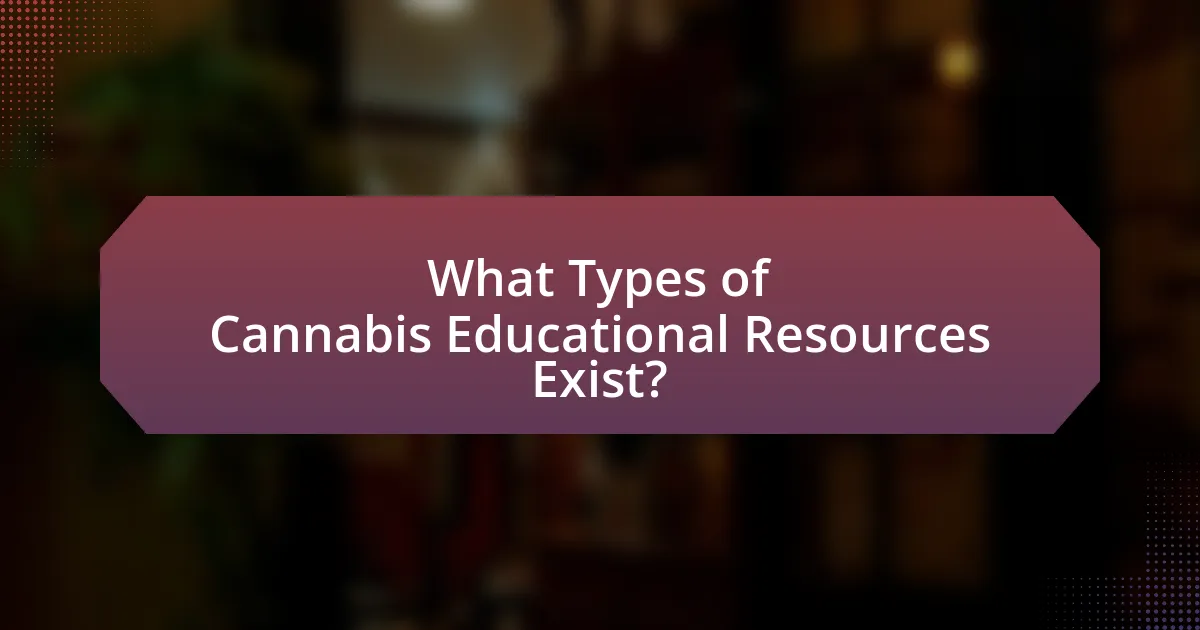
What Types of Cannabis Educational Resources Exist?
Various types of cannabis educational resources exist, including online courses, books, webinars, podcasts, and community workshops. Online courses, often provided by universities or specialized platforms, offer structured learning on cannabis cultivation, medicinal uses, and legal aspects. Books authored by experts in the field provide in-depth knowledge and research findings. Webinars and podcasts feature discussions with industry professionals, sharing insights and experiences. Community workshops allow for hands-on learning and local networking opportunities. These resources collectively enhance understanding and awareness of cannabis-related topics, supported by the growing body of research and industry developments.
How do different formats of resources affect their credibility?
Different formats of resources significantly influence their credibility by affecting how information is perceived and validated. For instance, peer-reviewed journal articles are generally considered more credible than blog posts due to their rigorous review process and reliance on empirical evidence. Research indicates that 70% of academic articles undergo peer review, which enhances their reliability compared to non-reviewed sources. Additionally, multimedia formats, such as videos or podcasts, can enhance engagement but may lack the depth and scrutiny of written academic texts, potentially diminishing their credibility. Thus, the format of a resource plays a crucial role in establishing its trustworthiness and the weight given to its content.
What are the differences between academic articles and popular media in cannabis education?
Academic articles and popular media in cannabis education differ primarily in their purpose, audience, and rigor of content. Academic articles aim to provide in-depth, research-based insights, often peer-reviewed, and are intended for scholars and professionals in the field. For example, a study published in the Journal of Cannabis Research may present empirical data on the effects of cannabis on health, supported by extensive citations and methodologies. In contrast, popular media, such as articles in lifestyle magazines or blogs, focus on accessibility and engagement for a general audience, often prioritizing entertainment or personal anecdotes over scientific rigor. For instance, a popular article might discuss cannabis use in a casual tone without extensive references, appealing to readers seeking quick information rather than comprehensive analysis. This distinction highlights the importance of evaluating sources based on their intended use and the depth of information provided.
How can online courses and webinars provide credible information?
Online courses and webinars can provide credible information by utilizing expert instructors and evidence-based content. These platforms often feature professionals with relevant qualifications and experience in the cannabis field, ensuring that the information presented is accurate and trustworthy. For instance, many online courses are developed in collaboration with universities or industry leaders, which adds a layer of credibility. Additionally, reputable online courses and webinars frequently reference peer-reviewed studies and current research, reinforcing the validity of the information shared. This reliance on established sources and expert insights helps learners discern credible educational resources in the cannabis sector.
What role do organizations play in providing credible cannabis education?
Organizations play a crucial role in providing credible cannabis education by developing and disseminating accurate information based on scientific research and expert consensus. These organizations, such as the American Cannabis Nurses Association and the National Organization for the Reform of Marijuana Laws, often collaborate with researchers and healthcare professionals to ensure that the educational materials they produce are evidence-based and reliable. For instance, the American Medical Association has published guidelines that emphasize the importance of using peer-reviewed studies to inform cannabis-related health discussions, reinforcing the need for credible sources in cannabis education.
Which organizations are recognized for their contributions to cannabis education?
Organizations recognized for their contributions to cannabis education include the National Organization for the Reform of Marijuana Laws (NORML), the Cannabis Certification Council (CCC), and the American Cannabis Nurses Association (ACNA). NORML advocates for the legalization of cannabis and provides educational resources on its benefits and legal status. The CCC focuses on establishing standards for cannabis products and offers certification programs that educate consumers about safe and responsible use. The ACNA promotes education and research on cannabis nursing practices, emphasizing the importance of informed healthcare regarding cannabis use. These organizations are pivotal in disseminating accurate information and fostering understanding of cannabis-related issues.
How can you verify the legitimacy of cannabis educational organizations?
To verify the legitimacy of cannabis educational organizations, check for accreditation from recognized bodies and review their curriculum for compliance with industry standards. Accredited organizations typically undergo rigorous evaluation processes, ensuring they meet educational quality benchmarks. Additionally, researching the organization’s history, faculty qualifications, and student testimonials can provide insights into their credibility. For instance, organizations affiliated with established universities or industry associations often have a more reliable reputation.
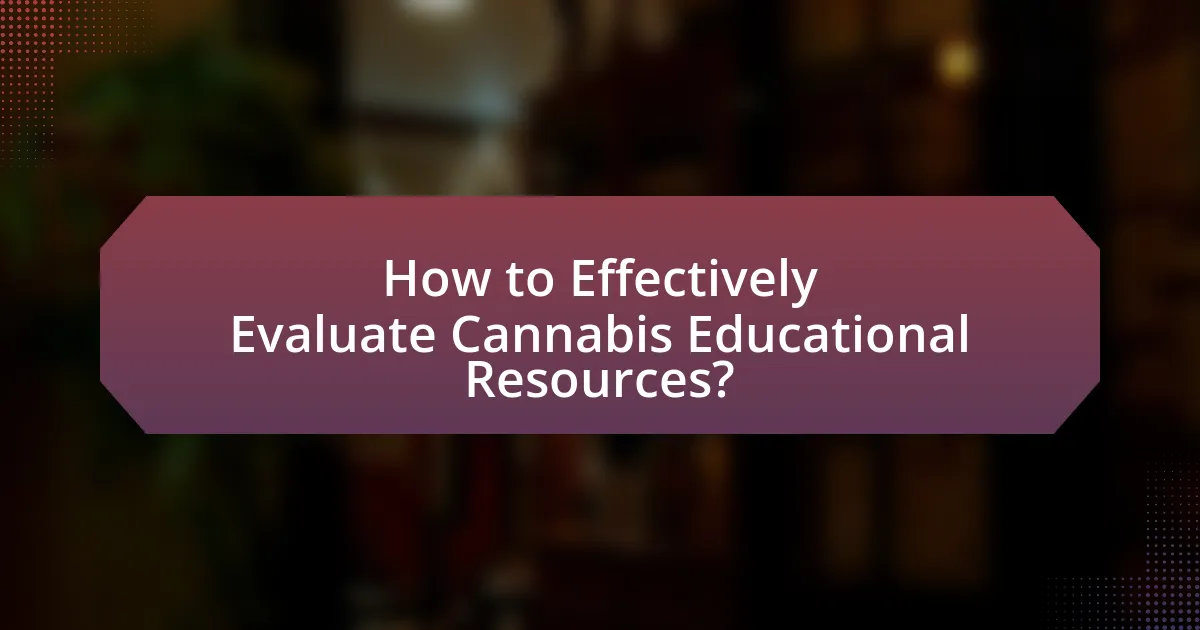
How to Effectively Evaluate Cannabis Educational Resources?
To effectively evaluate cannabis educational resources, assess the credibility of the source, the accuracy of the information, and the qualifications of the authors. Credible sources typically include academic institutions, government agencies, and established organizations in the cannabis field. For instance, research published in peer-reviewed journals, such as the Journal of Cannabis Research, provides reliable data and insights. Additionally, verify the information against multiple reputable sources to ensure consistency and accuracy. Authors with relevant qualifications, such as degrees in botany, pharmacology, or medicine, enhance the reliability of the content.
What steps should you take to evaluate a cannabis educational resource?
To evaluate a cannabis educational resource, first verify the credibility of the source by checking the author’s qualifications and expertise in cannabis-related fields. Next, assess the accuracy of the information presented by cross-referencing it with reputable studies or publications, such as those from peer-reviewed journals or established organizations like the National Institute on Drug Abuse. Additionally, consider the date of publication to ensure the information is current, as cannabis research is rapidly evolving. Finally, analyze the resource for bias by examining the language used and identifying any potential conflicts of interest, such as funding from cannabis companies.
How can you cross-reference information from multiple sources?
To cross-reference information from multiple sources, first, identify the key facts or claims presented in each source. Then, compare these facts across different sources to check for consistency and corroboration. For example, if multiple reputable cannabis educational resources report similar statistics about THC content in a specific strain, this consistency enhances the credibility of the information. Additionally, consider the authority of each source; peer-reviewed studies and publications from recognized institutions typically provide more reliable data than anecdotal reports. By systematically evaluating the alignment of information and the credibility of the sources, one can effectively cross-reference and validate the information.
What tools and techniques can assist in evaluating cannabis resources?
Tools and techniques that assist in evaluating cannabis resources include analytical testing methods, peer-reviewed research, and regulatory compliance checks. Analytical testing methods, such as gas chromatography and mass spectrometry, provide precise measurements of cannabinoid content and contaminants, ensuring the safety and efficacy of cannabis products. Peer-reviewed research, published in reputable journals, offers evidence-based information on cannabis effects, dosing, and therapeutic uses, allowing consumers and professionals to make informed decisions. Regulatory compliance checks ensure that cannabis resources meet legal standards set by government agencies, which is crucial for verifying the credibility and safety of the information provided.
What common pitfalls should you avoid when assessing cannabis educational materials?
When assessing cannabis educational materials, avoid relying on unverified sources, as they often lack credibility and accuracy. Many materials may present anecdotal evidence or personal testimonials without scientific backing, leading to misinformation. Additionally, be cautious of materials that do not cite reputable studies or expert opinions, as this can indicate a lack of thorough research. Furthermore, avoid materials that promote a specific agenda or product without presenting balanced information, as this can skew understanding. Lastly, be wary of outdated information, as cannabis research is rapidly evolving, and relying on old data can lead to misconceptions about current practices and regulations.
How can biases in cannabis education affect your evaluation process?
Biases in cannabis education can significantly distort your evaluation process by leading to misinterpretations of data and skewed perceptions of cannabis effects. When educational resources present information with a particular bias—whether pro-cannabis or anti-cannabis—this can influence the conclusions drawn during evaluation. For instance, a study published in the Journal of Cannabis Research found that biased educational materials often omit critical data, such as potential side effects or contraindications, which can mislead individuals assessing the safety and efficacy of cannabis. Consequently, reliance on biased information can result in poor decision-making regarding cannabis use, as evaluators may overlook essential aspects that are not aligned with the presented narrative.
What red flags should you look for in cannabis educational content?
Red flags to look for in cannabis educational content include lack of credible sources, sensationalized claims, and absence of scientific backing. Content that does not cite peer-reviewed studies or reputable organizations may indicate misinformation. Additionally, if the material makes exaggerated health claims without evidence, it raises concerns about its reliability. Furthermore, educational resources that do not provide author credentials or expertise in cannabis research can be deemed less trustworthy. Lastly, content that promotes products without discussing potential risks or side effects should be approached with caution, as it may prioritize sales over education.
What are some best practices for finding credible cannabis educational resources?
To find credible cannabis educational resources, prioritize sources that are peer-reviewed, authored by experts in the field, and backed by reputable institutions. Peer-reviewed journals, such as the Journal of Cannabis Research, provide scientifically validated information. Additionally, organizations like the American Medical Association and the National Institute on Drug Abuse offer reliable data and research on cannabis. Checking the credentials of authors and their affiliations can further ensure the credibility of the information.
